MercoPress. South Atlantic News Agency
Health & Science
-
Friday, July 24th 2009 - 14:20 UTC
Brazil to complain UK “dumping” of 1.000 tons of hazardous waste
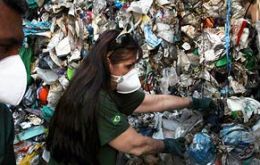
The Brazilian government said it will lodge a formal complaint with the World Trade Organisation over shipments of more than 1,000 tons of hazardous waste which arrived from Britain
-
Friday, July 24th 2009 - 14:00 UTC
Major world campaign against Foot and Mouth Disease

A major offensive aimed at bringing Foot and Mouth Disease (FMD) under global control has been launched by FAO and the Paris-based World Organisation for Animal Health (OIE).
-
Friday, July 24th 2009 - 13:54 UTC
Argentine scientists identified the complete genome of A/H1N1 virus

Argentine health authorities announced this week they had identified the complete genome of the A/H1N1 flu virus which so far has caused almost 200 deaths according to official numbers.
-
Saturday, July 18th 2009 - 15:40 UTC
Pigs contract A/H1N1 virus flu and Argentina issues national alert
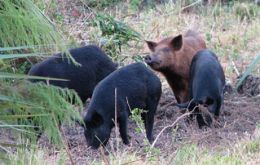
Argentina declared a nationwide alert on Friday after pigs in the province of Buenos Aires were confirmed to have the A/H1N1 flu virus, health authorities said. Thousands of people have contracted the virus in Argentina and 137 people in the country have died.
-
Thursday, July 16th 2009 - 15:46 UTC
OPS changes emphasis of A/H1N1 virus flu to “qualitative” info
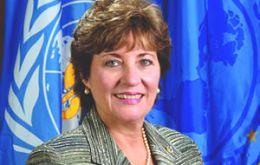
The Pan American Health organization, OPS, announced Wednesday it had changed its monitoring system for the A/H1N1 virus because figures released by the different countries do no really reflect the transmission of the pandemic.
-
Thursday, July 16th 2009 - 15:36 UTC
US travel alert to Argentina because of the H1N1 virus

The United States Department of State has sent out a travel alert to US citizens travelling to or residing in Argentina on the health risks associated with the World Health Organization (WHO)-declared 2009-H1N1 influenza pandemic, which has resulted in illness in numerous countries. The current outbreak in Argentina has caused federal, provincial, and municipal authorities to announce several measures to prevent the illness from spreading.
-
Tuesday, July 14th 2009 - 11:18 UTC
A/H1N1 influenza virus is “unstoppable” admits WHO
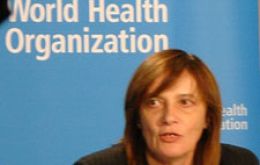
The new H1N1 virus is “unstoppable” reported on Monday the World Health Organization which gave drug makers a full go-ahead to manufacture vaccines against the pandemic influenza adding healthcare workers should be the first to get one.
-
Tuesday, July 14th 2009 - 11:10 UTC
Argentina convenes regional meeting to address H1N1 pandemic

Argentina called for a meeting of regional Public Health ministers to address the A/H1N1 virus situation and try to harmonize measures to counterattack the pandemic, announced the Ministry of Health in an official release.
-
Friday, July 10th 2009 - 12:31 UTC
Cruise passengers ill with Norovirus virus demand refund

Passengers on a cruise liner at the centre of a virus outbreak have said they will stay on the ship until they are promised their money back. The Marco Polo has been berthed at Invergordon on the Cromarty Firth in Scotland since Monday after hundreds of passengers and crew became ill with norovirus.
-
Thursday, July 9th 2009 - 13:01 UTC
“Special powers” in Chile to drive down cases of A/H1N1 virus influenza
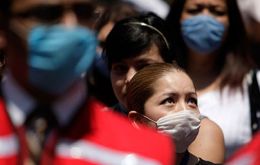
In the face of increasing numbers of hospitalizations and consultations relating to breathing problems related to flu, Chilean President Michelle Bachelet issued a decree this week giving the Health Ministry additional powers to address Chile’s current problems relating to the AH1N1 virus.